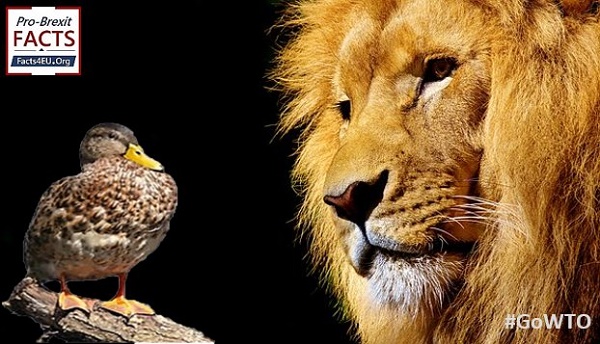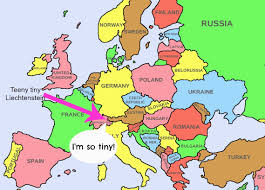What are the EEA and EFTA and what on earth was Gove thinking?
A simple explainer from the Facts4EU.Org Team on why the EEA/EFTA route isn’t Brexit

© Brexit Facts4EU.Org
'If it walks like a duck, and quacks like a duck, it’s not a lion'
Every six months or so, the question of membership of the ‘EEA’ and 'EFTA' is raised as a possible route to Brexit. In our article yesterday we reported on Michael Gove’s advocacy of this option at a dinner club for MPs and peers in June last year.
One MP who attended told the FT:
“[Gove] was steering the conversation towards the EEA idea.
There's no doubt about that.”
So what are the EEA and EFTA and why is it shocking that Gove was considering this?
We look at some key questions.
Brexit Facts4EU.org Summary
Why the EEA/EFTA theory is not a Brexit opiton
- What is the the ‘European Economic Area’ (EEA)?
- What is the ‘European Free Trade Association’ (EFTA)?
- How are they linked to EU membership?
- Does EEA membership give the UK control of its own laws? – No.
- Does EEA membership stop freedom of movement? – No.
- Does EEA membership mean escaping from the Single Market? - No.
1. What is the EEA?



Norway
Pop'n: 5.2 million
1/2 size of London
Iceland
Pop'n: 334,000
1/4 the size of Glasgow
Liechtenstein
Pop'n: 37,000
1/14th the size of Leicester
The European Economic Area (EEA) was set up in 1994 to extend the EU’s provisions on its Single Market to the European Free Trade Association (EFTA) countries. Switzerland is a member of EFTA but declined to take part in the EEA.
The EEA therefore consists of the 28 EU countries, plus 3 non-EU countries of Liechtenstein, Norway and Iceland. That’s 31 countries in total, but only three are not full members of the EU.
The UK is already member of the EEA by virtue of being a member of the EU.
2. What is EFTA?
The European Free Trade Association (EFTA) consists of four countries: The three EEA countries of Norway, Iceland and Liechtenstein, plus non-EEA Switzerland. The UK was a founder member in 1960, when EFTA was established. EFTA describes itself as:
“a framework for the liberalisation of trade in goods amongst its Member States” and “an economic counterbalance to the more politically driven European Economic Community (EEC).”- EFTA
As EFTA countries like the UK started joining the EU (then the EEC), they left EFTA, which is why it now contains only four countries.
Over the decades EFTA has become more like the EU, with its own court adopting the rulings of the ECJ. EFTA’s countries are all members of the EEA (see below) except Switzerland.
3. How are the EEA and EFTA linked to EU membership?
As stated above, all members of the EU are members of the EEA, including the UK.
Here is how EFTA describes things:-
“The European Economic Area (EEA) unites the 28 EU Member States and the 3 EEA EFTA States (Iceland, Liechtenstein, and Norway) into an Internal Market [‘Single Market’] governed by the same basic rules.
“These rules aim to enable goods, services, capital, and persons to move freely about the EEA in an open and competitive environment, a concept referred to as the four freedoms.”
- EFTA website
The EEA Agreement is based on two pillars of membership: EU and EFTA, each having their own respective mechanisms for supervision, in the form of the European Commission and EFTA Surveillance Authority, and courts, the Court of Justice of the European Union and the EFTA Court.
4. Does EEA membership give the UK control of its own laws? – No
Both Remainers and ‘soft’ Brexiteers have consistently spread the myth that if the UK left the EU but stayed in the EEA and also joined EFTA, then it would have escaped from the binding decisions of the EU’s Court of Justice (ECJ).
This is only partially true in theory, and not at all true in practice. The EFTA court shadows the ECJ and although the ECJ’s decisions are only ‘advisory’, in practice they are followed.
Here is the Chef de Cabinet of the EFTA Court in Luxembourg, Michael-James Clifton, writing in a personal capacity and stating that EFTA’s ‘Surveillance Authority’ must :
“ensure that the EEA/EFTA States live up to their obligations under the EEA Agreement by fully, correctly and timely transposing the common Internal Market [Single Market] rules (the acquis communautaire) into their domestic legal order and by applying these rules correctly.”
He goes on to say:
“The EFTA Court was founded in 1994 and shall follow relevant ECJ rulings handed down prior to the date of signature of the EEA Agreement (2 May 1992). This aimed at ensuring that from the outset the Single Market playing field was perfectly flat. The EFTA Court is required also to pay ‘due account’ to all subsequent relevant ECJ jurisprudence.”
“In practice, the EFTA Court makes no distinction between the two and pays equal regard to post 1994 ECJ case-law.”
- Michael-James Clifton, Chef de Cabinet, EFTA Court, Luxembourg
So, EFTA is governed by the EFTA Surveillance Authority and the EFTA Court. Whilst the EFTA Court is ostensibly separate from the EU’s European Court of Justice (ECJ), in practice it adopts its rulings.
5. Does EEA membership stop freedom of movement? – No
Put simply, no it doesn't.
As we have shown, membership of the EEA means membership of the EU's Single Market, which means accepting the four freedoms including the freedom of movement of people.
Some have argued that there is an emergency opt-out clause contained within the EEA agreement, whereby a country can suspend freedom of movement. This is wholly disingenuous.
This emergency clause was drawn up for little Liechtenstein, a 'country' of only 40,000 people - and it is for emergency use only. Any idea that this clause could be used by the UK as a permanent mechanism to suspend the obligation for freedom of movement of citizens from the EU is completely implausible.
6. Does EEA membership mean escaping from the Single Market? - No
As can be seen above, the EEA countries must obey the rules of the Single Market. This automatically defines EEA membership as preventing members from acting as free, independent countries.
Any proposal which does not involve ‘taking back control’ and becoming a sovereign country again is not a form of Brexit which would be recognised by the majority of people in the United Kingdom.
Observations
Continuing jurisdiction of a foreign court, continuing free movement, continuing in the Single Market
A small minority of pro-Brexit campaigners have always advocated an EFTA/EEA arrangement as a halfway house on the way to full Brexit. They and an increasing number of Remainers suggest that converting to an EFTA/EEA status would somehow be easier.
However any possible EFTA/EEA option immediately comes up against the EU’s four freedoms including freedom of movement, and as EFTA themselves say: “the common rules of the EEA Agreement are updated continuously with new EU legislation.”
In effect, access to the Single Market via EFTA and EEA membership leaves the UK where it was in many respects, and it would still require an enormous amount of negotiation.
Look at the existing members…
A look at the breakdown of the EFTA countries shows how strange it would be for the UK to join. Two of the four countries are tiny – Iceland with a population of 320,000 and little Liechtenstein with a population of just 37,000.
The economies of Norway (5m people) and Switzerland (8m) are both very different to that of the United Kingdom.
Conclusion
EEA membership – and the associated membership of EFTA – is nothing but another form of incarceration by the EU. The UK would continue to suffer free movement and would continue to suffer the indignity of its laws being made by a foreign court.
This is not any form of realistic Brexit.
If it walks like a duck, and quacks like a duck, it’s not a British lion.
Our articles require a great deal of research and it's not easy to reduce complex subjects into an easy read. Please help us to keep going with a donation if you can. Quick and secure donation methods are below. Thank you.
NOTE: As with anything connected to the EU, the picture is always complicated. The above simplifies just some of the key problems with the EEA route, but the full picture is of course more complex.
[ Sources: EFTA | EEA | EU Commission | Personal legal opinion by Barrister Michael-James Clifton, Chef de Cabinet of the EFTA Court | UK Constitutional Law Association ] Politicians and journalists can contact us for details, as ever.
Brexit Facts4EU.Org, 21 Jun 2019
Click here to go to our news headlines
And please scroll down for comments on the above article.
Since before the EU Referendum, Brexit Facts4EU.Org
has been the most prolific researcher and publisher of Brexit facts in the world.
Supported by MPs, MEPs, & other groups, our work has impact.
We think facts matter. Please donate today, so that we can continue to ensure a clean Brexit is finally delivered.
Paypal Users Only - Choose amount first
Quick One-off
Monthly


Something to say about this? Scroll down for reader comments